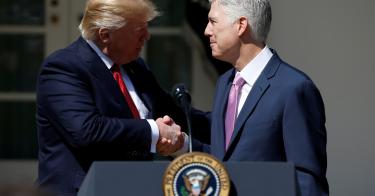Previous presidential candidates would talk about appointing judges only in generalities — if they talked about it at all. That changed In May and September2016, when Donald Trump took the unprecedented step of offering lists of individuals from which he would choose Supreme Court nominees. One conservative activist said at the time that the Court “needs more justices who will base their decisions on the law, not politics, even under pressure.”
Neil Gorsuch, then a judge on the U.S. Court of Appeals for the Tenth Circuit, was on the second list. On February 1, 2017, President Trump nominated him to replace Justice Antonin Scalia, and two months later, the Senate confirmed the appointment. As Gorsuch nears the end of his first full term as a Justice, let’s look at a few clues about the kind of Justice he is.
The first clue came even before Gorsuch was nominated. In January 2017, two scholars published a study in which they attempted to measure the “Scalia-ness” of those on President Trump’s lists.
Justice Scalia is often seen as the standard for the kind of judge that our system of government needs. He felt strongly that judges should follow the right process to reach the result in a case, rather than decide which result they wanted and then find a way to reach it.
The study’s authors quantified three measures of “Scalia-ness” and ranked Justice Gorsuch second out of the 16 judges they evaluated.
After Justice Gorsuch’s March 2017 confirmation hearing before the Senate Judiciary Committee, Elizabeth Slattery, my colleague at The Heritage Foundation, wrote: “Most importantly, he showed that he understands the limited role judges should play in our government.” Gorsuch repeatedly insisted that a judge must interpret and apply the law impartially, without relying on his own views or sympathies, and sharply distinguished between the law that judges must follow and policy that Congress has authority to make.
If actions speak louder than words, it’s time to start examining what Justice Gorsuch is doing now that he is fully participating in the Supreme Court’s work. Doing so requires using the same standard that President Trump did in assembling his list. Is Justice Gorsuch basing his decisions on the law, not politics, even under pressure? Is he following the right process to decide cases, or do the political ends justify the judicial means?
The two clues I’ll look at in this post are the first and the latest majority opinions authored by Justice Gorsuch. In Henson v. Santander Consumer USA, Inc., the Court last June unanimously clarified the meaning of “debt collector” in the Fair Debt Collection Practices Act. Four points describe what Justice Gorsuch thought was the proper judicial process.
- First, he noted “two related questions we do not attempt to answer today.” Judges should not address issues or answer questions that are not necessary to decide the case in front of them.
- Second, he emphasized that in addressing “the much narrowed question properly before us . . . we begin, as we must, with a careful examination of the statutory text.” The law that federal judges interpret and apply to decide cases isn’t some vague notion, personal impression, or good feeling. It’s written law, so judges should keep their feet on the ground and deal with what the law really is — text.
- Third, noting that the Court was being asked “to move quickly on to policy,” he wrote that “while it is of course our job to apply faithfully the law Congress has written, it is never our job to rewrite a constitutionally valid statutory law under the banner of speculation about what Congress might have done.” This echoes what Gorsuch had said during his confirmation hearing.
- Finally, he observed that, while “reasonable people can disagree with how Congress” wrote a statute, the “proper role of the judiciary [is] to apply, not amend, the work of the People’s representatives.” This Justice not only believes there is a “proper” role for the judiciary, he knows what it is.
Justice Gorsuch’s most recent majority opinion was released on May 21, 2018. Unlike Santander, his opinion in Epic Systems Corp. v. Lewis was for a Court divided 5-4. The Court held that federal law requires enforcing agreements between employers and employees that provide for settling disputes through arbitration. This case attracted significant media and political attention, with committed interests on both sides.
As he had in his confirmation hearing, Justice Gorsuch opened his opinion by writing: “As a matter of policy these questions are surely debatable. But as a matter of law the answer is clear.” He focused on the text and its context to determine the proper meaning of the relevant statutes and then concluded that the Court’s precedents agreed with what the statutes plainly mean.
As he had noted about the parties in Santander, Justice Gorsuch observed that “the dissent retreats to policy arguments.” He concluded his opinion this way: “This Court is not free to substitute its preferred economic policies for those chosen by the people’s representatives.”
Both of these cases required the Supreme Court to interpret and apply statutes. One opinion was unanimous and barely noticed; one was divided and hotly debated. Justice Gorsuch, however, took the same approach — he followed the same process — in each one.
What kind of Justice is Neil Gorsuch? The jury is, and will remain, out until his Supreme Court service is over. The early returns, however, signal that he is exactly the kind of Justice that President Trump presented him to be, that he professed to be in his confirmation hearing, and that observers predicted that he would be.
This piece originally appeared in National Review



